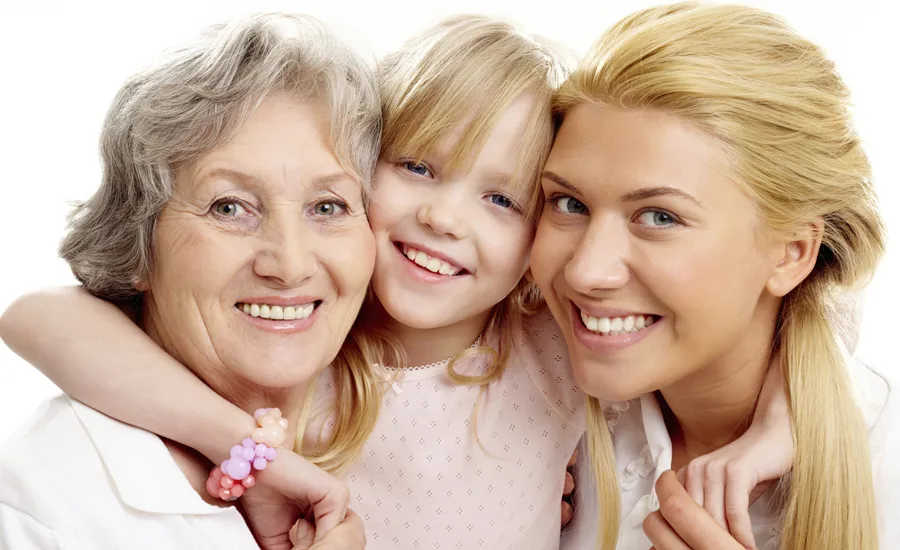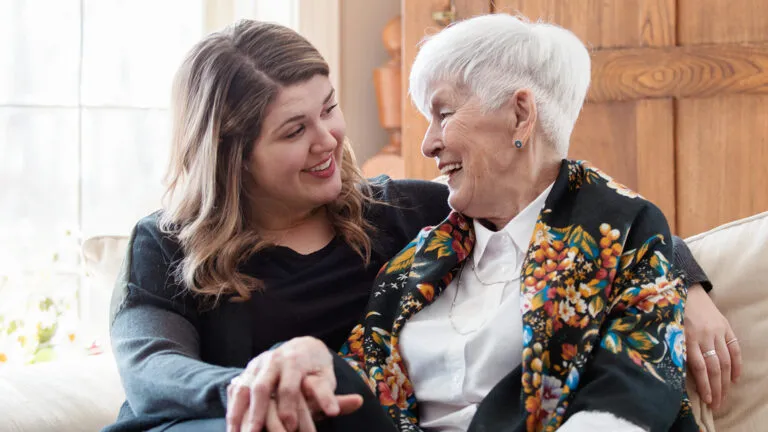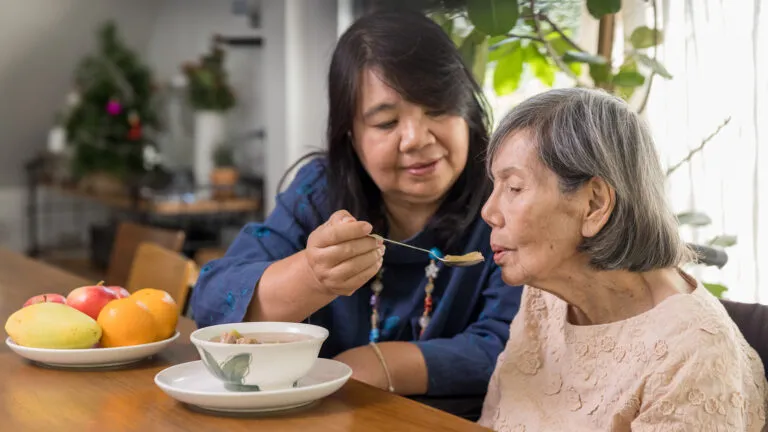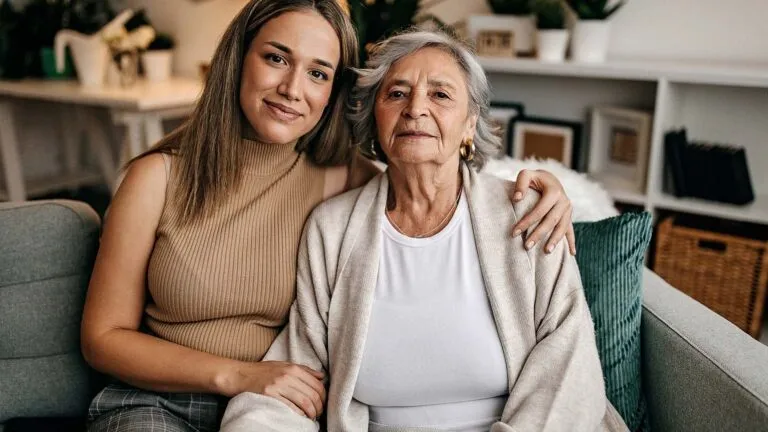When my widowed mother first moved into the in-law apartment attached to our house, I wasn’t so sure it was going to work out.
For as long as I could remember, “prickly” was the best way to describe our relationship. When I was a little girl, I remember thinking how my mother and I were like two negatively polarized magnets fighting an invisible force that pushed us apart.
I loved my mother, but we were different in so many ways. She was comfortable with clutter. I was a bit of a control freak. My idea of fun was alphabetizing the books in my bedroom, while my mother loved to spend the day shopping.
My mother loved when friends stopped by unexpectedly for a cup of tea and a chat. I enjoyed company too, but preferred advance notice. Twenty-four hours. Minimum.
What, I wondered, would it be like with my mother living so close, with nothing separating us but a thin wall?
When it comes to caring for an aging parent, I am no expert. I’m just a woman with my own story to share. Here are the four most valuable lessons I learned.
1. Expect the Unexpected
Many times when caring for my mother, I was reminded of being a new parent; I often found myself paddling in uncharted waters, “making it up” as I went along. There is no one-size-fits-all manual for new parents because every child is different, and the same applies to caring for an aging parent.
Among the variables at play is the nature of the adult child-parent relationship (close/distant, healthy/unhealthy) itself. Add to that financial circumstances; housing arrangements; mental, emotional, physical and spiritual health; and the availability and willingness of the adult child’s siblings to help. Complicating matters even more is the fact that each of these variables is maddeningly fluid.
Inevitably, just when we had established a smooth-as-glass daily routine, a new (often health-related) challenge would crop up, shattering our presumptions. We would then have to pick up the pieces and start over, working to create what we came to call a “new normal.”
For example: When my mother came to live next door in her late 70s, her vision was poor, but she was still able to drive. She could maintain her independence, and so could I.
We found ways to help with her declining vision. My husband installed bright halogen lights in her living room. My sister, who lived an hour away, sent away for a special telephone with big numbers.
We used colorful plastic adhesive buttons to identify the proper settings on her thermostat and microwave. We bought an electronic magnifying monitor to help her read mail.
I didn’t know how bad my mother’s vision had gotten until I saw her stooped in her living room, reaching to pick something off the floor. She grabbed at it and then studied her empty thumb and forefinger. Again she tried to pinch the glimmering spot on the rug. Nothing. Frowning, she turned to me.
“Mom,” I said, “it’s just a patch of sunlight.”
She shook her head, wary to admit something was wrong.
“I don’t think I should be driving anymore,” she said.
With that one sentence, the familiar routine and healthy boundaries we had built suddenly became as blurred as her vision, and for a moment I couldn’t breathe.
If Mom couldn’t drive, who was going to take her to the grocery store? To doctors’ appointments? To visit her friends?
She was going to need help. Lots of it. My life was already so busy with two teenagers, work, a new puppy and managing my own household.
How was I ever going to meet my mother’s needs?
2. Don’t Be Ashamed to Ask for Help
For a while I tried to do it all myself. But inevitably feelings of burden, resentment and guilt piled up like dirty laundry.
It didn’t help when well-meaning friends would say, “Oh, you’re such a good daughter to be taking such good care of your mother.” No, I’m not, I wanted to say. If I were honest, I’d admit that much of what I do for my mother is more about duty than love.
When I picked up my Bible for guidance, I felt only more confused. Especially when I came across the Fifth Commandment: “Honor your father and mother.”
“What does that mean?” I grumbled to my husband. “To honor your mother? I mean, what exactly does God want from me? Is there such a thing as giving up too much for another?”
“I don’t know,” said Tom. “But you’re not the only person dealing with an aging parent. Maybe there’s someone who can help.”
3. Know That You’re Not Alone
The next day, I made an appointment to visit a minister at our church. She was an expert in geriatric pastoral concerns, beloved by many older members of the congregation. Now she leaned forward and listened intently.
“Oh, Kitty,” she said. “It’s so good you came to talk. You’re a classic example of a woman trapped in the sandwich generation.”
I’d heard of the Greatest Generation. The Me Generation. Generation X. But the sandwich generation?
“You’re being squeezed by both generational ends,” she explained. “You’re caught between being a wife and mother, and taking care of your own mother. I imagine you must feel pretty squished.” She smiled sympathetically.
“Yes!” I agreed. “There are days when that’s exactly how I feel.”
“You ask about the Fifth Commandment, what it means to ‘honor’ your mother,” she said. “It’s a good question. The word honor means to respect, to hold in high esteem. It can also imply a certain formality—even distance. God understands that you have primary responsibilities to your husband and children. I don’t think He expects you to be all things to all people all the time.”
“It’s important to realize that you’re not alone,” she said. “More and more of us find ourselves caring for aging parents. There are resources to help you and your mom.” She wrapped her arm around me. “You know, God put us here on Earth to help each other.”
With her help, I learned that our town provided a free service for seniors who needed transportation. And two mornings a week, an energetic woman came to help my mother with her correspondence and errands.
My sister pitched in with frequent visits and took my mother shopping and to her appointments. And all those ladies who liked to stop by for tea and a chat—my mother’s many friends—were only too glad to help. Although my mother could no longer drive, our life together became a “new normal.”
4. Look for God’s Surprises Along the Way
I read once that courage is not about being fearless but about taking action and moving forward despite being afraid. My mother, in the positive way she dealt with her blindness, is probably the most courageous person I have ever known.
Had I not had the opportunity to observe her as she confronted the challenges associated with aging, I never would have fully appreciated her strength and optimism.
Likewise, our two now-adult children were able to witness a woman who faced growing old with incredible grace. My mother was a wonderful role model for our whole family. I only hope when I am older that I can be so brave.
Having my mother live next door to us for the last 12 years of her life was a surprising and unexpected gift. Despite our differences, by the time my mother passed away at age 90, I had grown to respect, understand and love her in a way I would never have dreamed possible.





